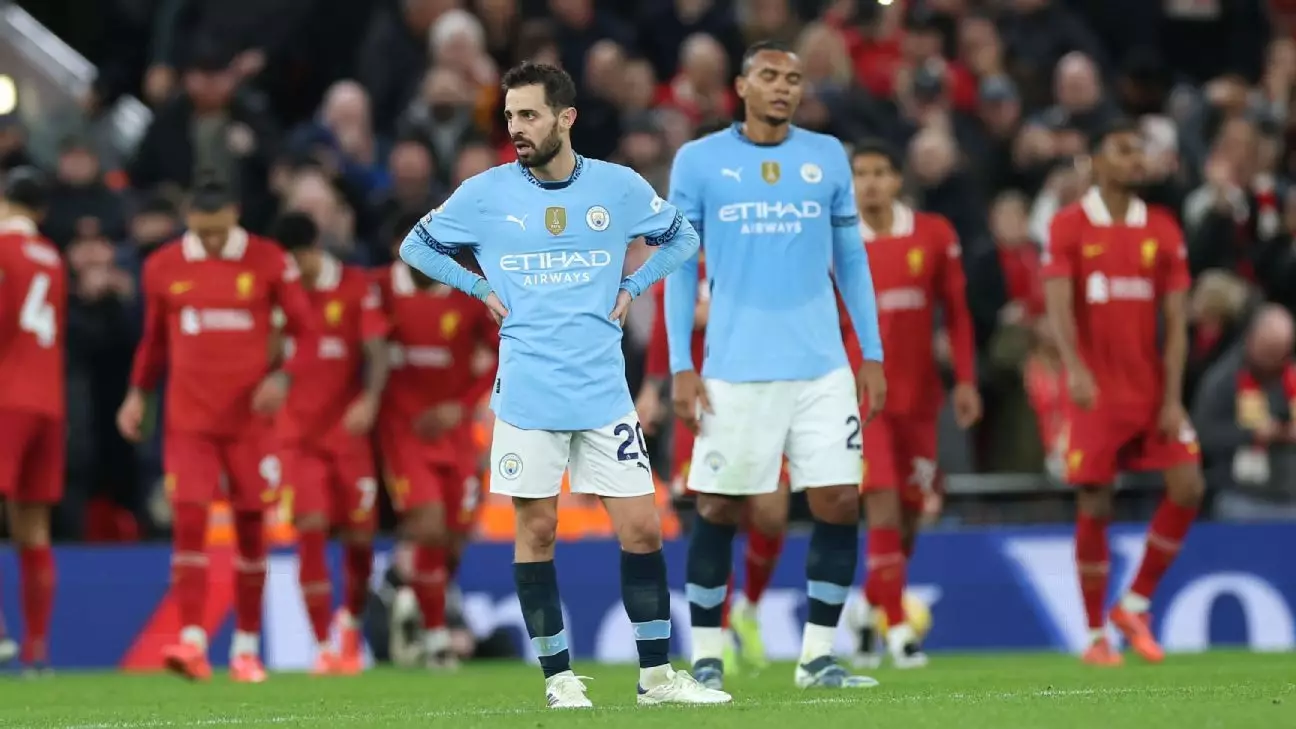The realm of football is notorious for its cyclical nature, where triumphant teams gradually find themselves succumbing to the weight of time, missteps, and an evolving landscape. Manchester City, a titan in contemporary football, is currently wandering down that uncertain path. Although the tenure of Pep Guardiola at the helm has brought unprecedented success—including multiple league titles and a prestigious Champions League trophy—recent performances suggest that a significant shift may be underway. The indicators of decline are unmistakable, revealing a club that could be on the brink of a challenging transition.
Recognizing the Warning Signs
Historical precedent serves as a harsh reminder to City fans: the downfall of once-great teams often unfolds gradually, shrouded in denial and misguided optimism. Take, for example, Manchester United’s post-Sir Alex Ferguson era, where belief in outdated glory has led to stagnation for over a decade. Similarly, Liverpool, following their heydays in the late 20th century, found themselves in a lengthy championship drought that lasted 30 years, fueled by nostalgia over strategic miscalculations.
The most recent match against Liverpool, wherein City suffered a 2-0 defeat, marked their sixth setback in seven encounters and illuminated the potential pitfalls of this great club. This loss not only reflects the instability of their current form but also serves as a tough wake-up call regarding systemic issues that could threaten their legacy. The City squad looked unrecognizable compared to their dominant self of yesteryears, highlighting the absence of the grit, energy, and tactical precision that once characterized their game.
A deep dive into City’s current roster reveals a concerning trend: the risk of relying on aging players misaligned with the pace of a rapidly evolving competition. Key figures such as İlkay Gündoğan, Nathan Aké, and Kevin De Bruyne, while having contributed massively to the club’s success, exhibit signs of decline that cannot be ignored. Poor recruitment has compounded these issues, leading to an increasingly fragile roster. The decision to re-sign Gündoğan from Barcelona, as he neared the twilight of his career, seems driven more by nostalgia than by prudence.
Moreover, the summer signing of Matheus Nunes adds to this puzzle. Yet, despite his hefty price tag, he has failed to make a tangible impact, and when paired with Gündoğan at Anfield, the inadequacy of City’s midfield became evident. The combination of aging stalwarts and subpar newcomers raises crucial questions about Manchester City’s strategy, mirroring the gradual declines witnessed in previous great teams.
Failing to Plan for the Future
Manchester City appears to be at a crossroads, facing a grim reality regarding the need for a revitalization strategy. Aging players such as Kyle Walker and De Bruyne have not seen suitable replacements developed or acquired. Their significance in Guardiola’s tactics cannot be overstated, and losing players of their caliber without a plan for succession is gambling the future of the club.
Past champions like Liverpool had also failed to execute timely transitions, clinging too long to legendary figures without adequately identifying successors. United’s attempts to fill the gaps left by legends like Rio Ferdinand and Patrice Evra with younger options like Chris Smalling and Phil Jones resulted in a path of underperformance.
In a similar vein, City’s decision to release promising young talents—including Cole Palmer and Julián Álvarez—could jeopardize their long-term stability. These players could have provided the necessary youthful exuberance alongside seasoned professionals, thus preventing the brittle state that currently poses a threat to Manchester City’s identity.
The recent matches where City failed to perform against teams like Bournemouth, Brighton & Hove Albion, and Tottenham Hotspur raise alarms over their perceived invulnerability. Their opponents, once overawed by City’s reputation, now approach matches with a sense of confidence that was previously absent. This change is indicative of a broader trend: complacency clouding one’s vision can lead to unforeseen vulnerability.
City may still find themselves clinching significant victories this season, and a trophy is conceivable. Yet, the message remains clear: a decline is underway. Past glories may shield them momentarily, but the need for immediate proactive measures to redefine the club’s future has never been more urgent.
This abrupt shift occurs often in football, catching supporters and pundits off guard alike—until the reality becomes irrefutable. As Guardiola and his squad navigate this pivotal phase, the pressing question lingers: can Manchester City reconcile with its past while forging a viable and vibrant future? The answer will inevitably dictate the trajectory of this once-great club.

